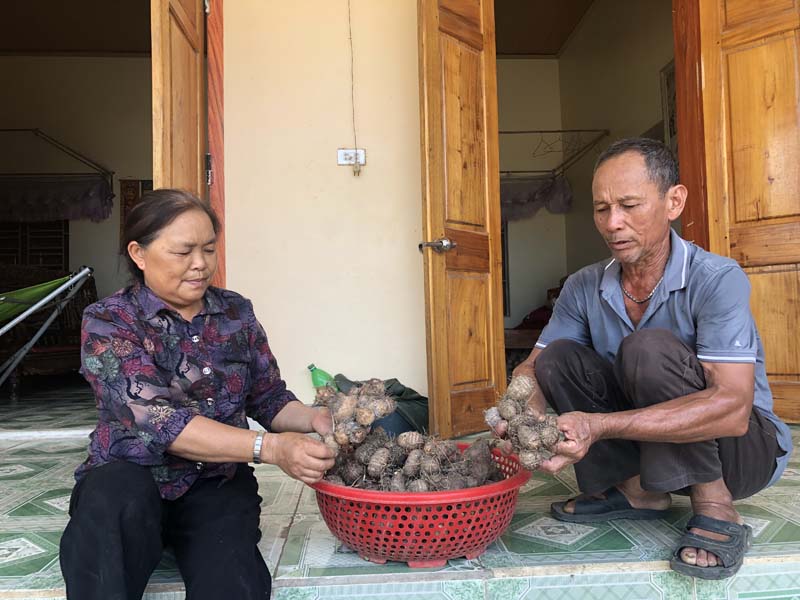
(HBO) - Taros made by Yen Tri agricultural cooperative in Yen Tri commune have been selected by Yen Thuy district to join the provincial-level One Commune, One Product (OCOP) programme in 2020.
 Members of Yen Tri agricultural cooperative (Yen Thuy)
prepare quality taro seedlings.
Members of Yen Tri agricultural cooperative (Yen Thuy)
prepare quality taro seedlings.
Yen Tri taro has a good and delicious taste, wining consumers’ favour. Taro growing brings high
profits to farmers. The communal Party committee and authorities encouraged
local residents to expand farming areas meeting OCOP standards to improve product value and create a stable
consumption market.
Yen Tri commune is home to about 20 ha of taros grown in all hamlets, mostly in Ao Hay with seven ha. Bui Xuan Bac from Ao Hay hamlet, a member of Yen Tri agricultural cooperative said his family plants around 3,000 sq.m of taros this year, yielding more than four tonnes. Taro is drought-resistant,
easy to grow with few pests.
With the use of decomposed manure, taro plants grow
well with a lot of tubers. Thanks to mastering cultivation techniques, taros
enjoy bumper harvest almost every year. Selling prices are stable, ranging from
15,000 – 17,000 VND per kg. Income from taro cultivation is 4-5 times higher
than rice. This year, the cooperative’s taro products register to join the OCOP
programme. "As quality is a crucial factor, we are aware of improving it,” Bac said.
In order to help the
cooperative join the programme, the communal Party Committee and authorities partnered with the cooperative to raise its
members and farming households’ awareness of expanding taro area, farming
techniques and set of criteria for OCOP grading.
The cooperative
registered for origin traceability and is completing dossier and packaging. It
also partnered with taro farming households to expand cultivation areas and
ensure the supply of materials. For the next crop, the commune plans to grow
nearly 7ha of taros meeting VietGAP standards. If meeting OCOP standards, its
value will be raised, contributing to ensuring the sustainable development of
local agriculture sector and improving farmers’ lives./.
The Standing Board of the Hoa Binh provincial Party Committee has agreed in principle on a proposal by the Standing Board of the Party Committee of Hoa Binh city to gather feedback on the city’s 1:2000 zoning plan, which forms part of its broader urban development strategy.
Hoa Binh province has made notable progress in public administration reform and digital government development, with the satisfaction index among citizens and businesses reaching over 84%, according to recent government evaluations.
Thanks to great efforts by local authorities in recent times, the governance and public administration performance of Mai Chau district has been significantly improved.
In the afternoon of June 6, the Party Committee, the People's Council, the People's Committee and the Fatherland Front of Lac Son district solemnly held a meeting to celebrate the 139th anniversary of the district's founding (1886–2025) and the 79th anniversary of the establishment of the district's Party Committee (1946–2025). There was the attendance of Mr. Bui Van Thang, the Vice Chairman of the Provincial People's Council; Mr. Quach Tat Liem, the Vice Chairman of the Provincial People's Committee; Ms. Dang Bich Ngoc, the Deputy Head of the National Assembly Delegation of the province; as well as the former leaders of the province and district through various periods, who are the natives of the district.
Implementing the Politburo’s Resolution No. 57-NQ/TW on breakthroughs in science – technology, innovation, and digital transformation is a golden opportunity for the northern mountainous province of Hoa Binh to renew growth model, improve competitive edge and shorten digital gap.
Resolution 57-NQ/TW, issued by the Politburo on December 22, 2024, identifies sci-tech, innovation, and digital transformation as strategic breakthroughs to build a developed and prosperous nation. In Hoa Binh province, this spirit is not just a slogan, it’s being put into action through concrete initiatives that form a "new development triangle”: digital citizenship, digital economy, and digital administration.



 Members of Yen Tri agricultural cooperative (Yen Thuy)
prepare quality taro seedlings.
Members of Yen Tri agricultural cooperative (Yen Thuy)
prepare quality taro seedlings.